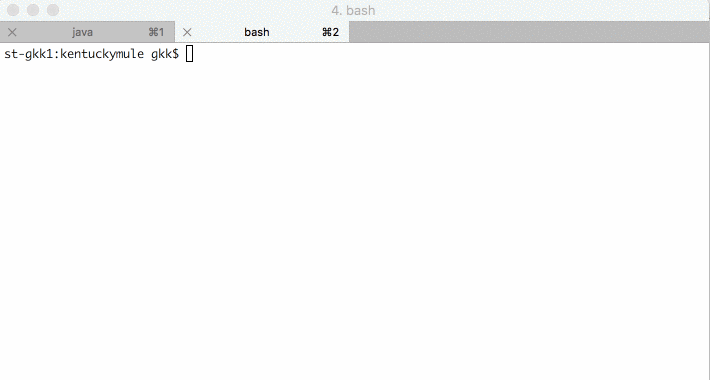Kentucky Mule is an exploration of an alternative architecture for Scala compiler design (specifically typechecker) with a focus on speed. Lessons learned from Kentucky Mule apply to a wide range of possible compilers and are not limited to just the Scala compiler.
Kentucky Mule's origins are described in my blog post Can Scala have a highly parallel typechecker?
Since the time I wrote the blog post, I rephrased the original question into a twofold one with only winning outcomes:
How to build a highly parallel and high-performance typechecker, or does Scala have a fundamental language design flaw that prevents such from being made?
The prototype in this repo computes the outline types I described in the blog post. The outline types enable the computation of dependencies between symbols in the symbol table.
Status update (August 2020): Kentucky Mule served its purpose as a research vehicle and is in a retired state. More on this in the blog post I wrote: https://gkk.dev/posts/status-kentucky-mule-faster-scala-compiler
Kentucky Mule is the name of a bourbon-based cocktail served at Beretta, a San Francisco restaurant. Other ingredients of Kentucky Mule are ginger beer, lime juice, a pinch of cane sugar, and mint as garnish.
Kentucky Mule is mixed and served in Collins glass at 1199 Valencia St in San Francisco's Mission district.
Let's see Kentucky Mule in action. Below Kentucky Mule is analyzing
scalap
sources and printing dependencies as seen at the API level, without
typechecking method bodies:
Kentucky Mule processes over two thousand lines of code in 600ms on a cold JVM.
Once the JVM is warmed up, the parser becomes the bottleneck. If I skip parsing in benchmarking, Kentucky Mule calculates outline types at the speed of processing over 4.4 million lines of Scala code per second.
If I add dependency extraction and analysis (as presented above) of scalap sources, the performance is at 1.8 million lines of Scala code per second.
The form of typechecking (or "pre-typechecking") implemented by Kentucky Mule is
a very stripped-down version of the real typechecking scalac performs when
computing types of declarations. However, there's one benchmark in the repo
where the comparison is fair. The name of the benchmark is 10k.scala.
In this specific benchmark, the scalac and Kentucky Mule carry out very
comparable work. And the performance of both is different. The Scala compiler
type checks the 10k.scala file at the speed of 7k lines of code per second.
Kentucky Mule type checks the 10k.scala file at the speed of 15m lines of code
per second. Yes, Kentucky Mule is that blazingly fast.
See my notes in notes.md for more details about this benchmark.
Kentucky Mule runs with these two commands:
$ sbt assembly
$ scala -cp kentuckyMule.jar kentuckymule.Main
The goal of Kentucky Mule wasn't a working implementation but trustworthy numbers. I wanted to get a sense of whether ideas for parallelizing Scala typechecking have a leg to stand on. The idea was to estimate the limits of Scala typechecking performance with as little development cost as possible.
The original goal drove principles of Kentucky Mule development:
- Transparent pricing - I added many benchmarks, and at each step of implementing Kentucky Mule, I measured the performance cost of supporting a Scala feature.
- Only the paranoid survive - many smart people have tried to optimize the Scala compiler performance before by following the conventional wisdom to "avoid premature optimization" and had minimal results. Kentucky Mule takes a paranoid approach and assumes to sit at the fringes of prevalent software construction practices. Almost everything in Kentucky Mule is an exercise in premature optimization.
- It's a voyage - my goal was to explore fresh ideas in compiler architecture. I wanted to see effects on potential performance gains of an implementation driven by different architecture compared to what one finds in Scala and Dotty, javac, and many other compilers in the wild.
- Loss aversion driven development - performance losses are easier to defend against over performance gains to win. This principle is about limiting the search space for a performant implementation. Instead of having a feature-rich but slow implementation with unknown directions for optimizations, I started with a tiny, feature-less implementation, and iterated over implementing new features incrementally and carefully watching the performance. The advantage of the latter approach is that, at each step, the direction is easier to spot: I know the feature I want to implement and the change to code is relatively small. Small changes to logic are easier to understand from the performance-cost point of view. This principle is inspired by the loss aversion effect described in economics and decision theory.
In particular, the code of Kentucky Mule doesn't use any of the functional programming idioms. Even higher-order functions occur rarely. If there were an investigation of whether I'm a fan of functional programming, this codebase would kill any defense line envisioned even by the best lawyer money can find.
Check notes.md for details of the architecture explored in Kentucky Mule that leads to high-speed performance.
Kentucky Mule is licensed under the 3-Clause BSD License
Kentucky Mule borrows the Scala parser from Dotty and for that reason is licensed under the same license.
